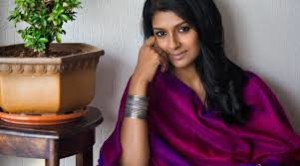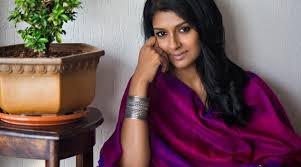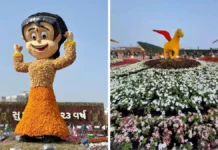 Filmmaker Nandita Das’ labor of love, ‘Manto’, has been shortlisted to compete in the Un Certain Regard this year at the Cannes film festival. The category runs parallel to the competition for the coveted Palme d’Or. Neeraj Ghaywan’s, ‘Masaan’ (2015) was the first Indian film to win the Promising Future prize in the section.
Filmmaker Nandita Das’ labor of love, ‘Manto’, has been shortlisted to compete in the Un Certain Regard this year at the Cannes film festival. The category runs parallel to the competition for the coveted Palme d’Or. Neeraj Ghaywan’s, ‘Masaan’ (2015) was the first Indian film to win the Promising Future prize in the section.
Following are excerpts from an interview Nandita Das gave to Bollywood Times:
Manto has been shortlisted in the Un Certain Regard section at the Cannes film festival. Do you think such a prestigious platform will help a film like ‘Manto’ grab more eyeballs and get a wider reach?
Sadly in India, we write more about the Cannes red carpet and designer outfits, but there is so much more to it. Over the years, I have seen some incredible films, I have had some very interesting conversations about cinema and life and deep down, I wished for ‘Manto’ to start its journey at Cannes. The Un Certain Regard is one of the two main sections in Cannes, the other one being the main competition section, which has far more glitz, but it is said that Un Certain Regard has the gems. It actually makes it more daunting, as I am sure some of the best films are in this section. In India, when people talk about film festivals, often they are either full of awe or full of disdain. We have either made film festivals a benchmark to gauge the film’s credibility or we have pushed it into a niche where only pretentious arty people meet. Without sounding judgmental, often these comments are from people who haven’t been to any festivals, because those who have would know that most festivals are nothing more than a gathering of cinema lovers. It’s at festivals like Cannes that you can watch films from around the world, meet a cross section of people and have a stimulating time.
You have been a jury member twice. Does that help when your film is shortlisted in the competition section, as you know what kind of narratives or films will make an impression? Does that give you an edge?
Not at all. It only helps in ensuring that the selectors will watch the film, but it doesn’t impact their decision at all. After all, a two-time winner of Palme d’Or and a jury president, Emir Kusturica’s film ‘On The Milky Road’ was not selected a few years ago. It’s a pity that in India, we are so cynical, but maybe for good reason as nepotism works here. In fact, a lot of people asked me if we had got in, a day in advance, assuming I would know. I got to know about Manto being shortlisted only on the morning the results were announced. Many people’s hard work and passion have gone into the film, but of course, the proof of the pudding is in its eating, so I will wait for how the audience receives it at Cannes.
What urged you to tell the story of Saadat Hasan Manto? How is it relevant to our times?
I was struck by Manto’s simple yet profound narratives. He wrote as he saw, as he felt, without dilution, and with a rare sensitivity and empathy for his characters. For years I’ve been thinking of making a film based on his short stories, even before I made my directorial debut, Firaaq (2008). In 2012, when I delved deeper into his essays, they helped the idea expand beyond his stories. Through him, I feel I am able to kindle my own conviction for a more liberal and compassionate world. The deeper I delve into this project, the more convinced I am about the relevance of Manto in these times. Not much has changed… almost 70 years later, we are still grappling with issues of freedom of expression and struggles of identity. Even today, our identities are inextricably linked to caste, class and religion as opposed to seeing the universality of human experience. I know he would have a lot to say about the times we live in. It is no surprise that so much is being written about Manto and that many theatre groups are performing his plays and essays. He was relevant then and will continue to be relevant for a long time to come. Manto wrote, “If you can’t bear my stories, it is because we live in unbearable times.” The stories only reflected what happened in society. So, I think it is relevant not just in our subcontinent, but also around the world. Artists, writers, free-thinkers and rationalists are all being attacked in some form or the other and are being silenced. Any society grows and develops when you have people speaking the truth and thinking differently. If you silence them, what hope do we have?
Does the film make a political statement? If yes, are you apprehensive about its reception?
For me, everything is political. Not to take a stand, I believe, is also a political choice. Both ‘Firaaq’ and ‘Manto’, were born out of my sociopolitical concerns, but were manifested through very personal stories. Finally, it is only human stories that move us. In times where a mainstream film that glorifies the Rajput velour is being attacked, anything can happen. Yet, I feel that Manto’s story is more about a writer’s conviction and courage, his angst and loneliness. His ability to speak truth with power, I feel, will resonate. After all, I feel there is a Mantoiyat in all of us — the part that wants to be free-spirited and outspoken. And what can be controversial about that?
What did you see in Nawazuddin Siddiqui that made you want to cast him as Manto?
They say if you get casting right, 70% of your job is done, and with Nawazuddin, that’s exactly what I feel. He looks and feels the part. And he has an incredible range as an actor. Also, Nawaz has many traits that are similar to Manto — deep sensitivity and intensity, anger and a straight-faced sense of humor. And these innate qualities in Nawaz have helped him transition into Manto quite effortlessly.







